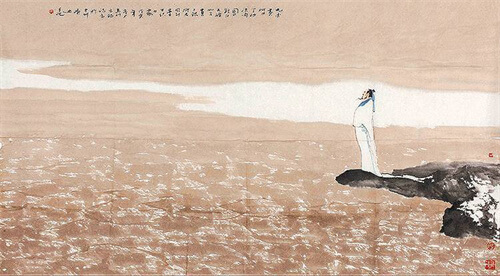杨柳枝词(其一)
塞北梅花[1]羌笛吹,
淮南桂树[2]小山词。
请君莫奏前朝曲,
听唱新翻杨柳枝。
注释:
[1] 梅花:指汉乐府横吹曲中的《梅花落》曲,用笛子吹奏。
[2] 桂树:指代《楚辞》中的《招隐士》篇。相传西汉淮南王刘安门客小山之徒作《招隐士》篇来哀悼屈原。
Willow Branch Song (Ⅰ)
Liu Yuxi
The flute played on “Mume Blossoms” on Northern Frontier,
“The Laurel Branch” to Southern River shore was dear.
They were sung in the former dynasties for long.
Now listen to my newly composed “Willow Song” .

《杨柳枝词》是唐代诗人白居易创作的一首七言绝句。这是一首写景寓意诗,前两句写景,极写柳树的美态,诗人所抓的着眼点是柳条,写出了动态、形态和色泽显出它的材质之美。后两句写的是诗人对柳树遭遇及自己的评价,因为柳树所生之地不得其位,而不能得到人的欣赏,寓意怀才不遇而鸣不平,含蓄地抨击了当时的人才选拔机制和相关政府官员。
The poem “Willow Branch Song (Ⅰ)” is a seven-line poem written by Bai Juyi, a poet of the Tang Dynasty. The first two lines of the poem are about the beauty of the willow tree, and the poet focuses on the willow, showing the dynamics, form and color of its material. The second two lines are about the poet’s evaluation of the willow tree and his own, because the place where the willow tree was born was not allowed to get its place and could not be appreciated by people, implying that the willow tree was not met with talent and was unjust, implicitly attacking the talent selection mechanism and relevant government officials at that time.








